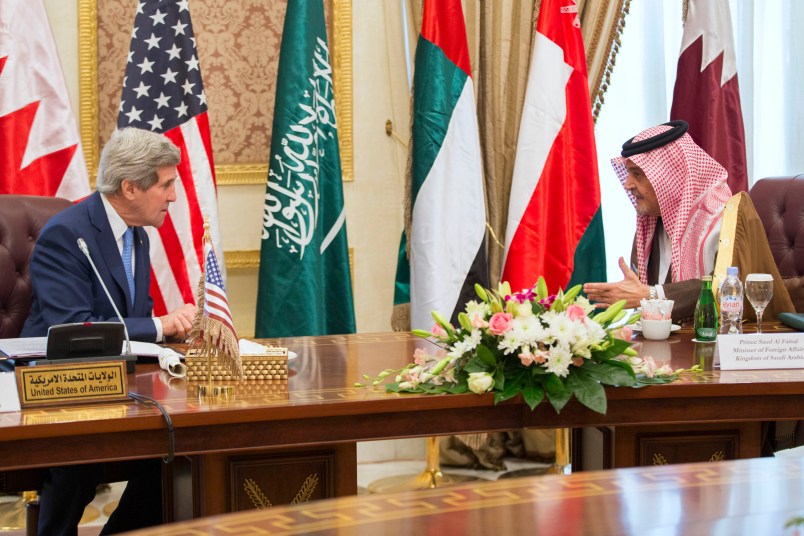Secretary of State John Kerry and President Obama have just succeeded where so many have failed (or not even attempted to try). Last week’s announcement of a framework for an agreement between the world’s major powers and Iran on the latter’s nuclear program was, according to President Obama, “a once-in-a-lifetime opportunity”—and a major win for American diplomacy.
To be sure, we weren’t the only ones in the room. Diplomats from the United Kingdom, France, Germany, China and Russia have been hard at work with American and Iranian negotiators for a year and a half now working towards the goal of preventing an Iranian nuclear weapon. But it was American leadership, from Congress and the Obama Administration, that rallied our allies to the cause and imposed tough sanctions on Iran. And when Iran came to the table, we saw tangible results. For the first time in history, key parts of their nuclear program were frozen or rolled back.
The theme is that tough diplomacy can keep us safe; yesterday’s breakthrough keeps building on our progress. Under the framework released, Iran’s pathways to a nuclear weapon are cut off. Enrichment of uranium is severely limited, the heavy water reactor at Arak will not reprocess Plutonium, and Iran will be the toughest inspections and transparency regime for any nuclear program in history. Facilities and stockpiles once very worrying to the the world will be modified, closed, or shipped abroad. To be sure, there are details to be ironed out—and the devil can certainly be in the details on these things. But a path forward for diplomacy that stops an Iranian bomb is cause to celebrate.
Optimism aside, let’s be clear: just because we’ve reached this point with Iran doesn’t mean our relationship is repaired, or that we have to start trusting them. In fact, the deal taking shape is dependent on Iran proving its adherence to these terms every step of the way. And should inspectors find evidence that Iran is cheating—whether that happens one day or one decade after tomorrow—the international community stands ready to snap sanctions back into place. Regardless of what any final agreement may say, our commitment to ensuring against an Iranian nuclear weapon has no expiration date.
At the same time, it’s hard not to be in a good mood after hearing such big news. This is an exciting moment in history. The opportunities for broader rapprochement between Iran and the West are endless. Increased trade, cross-cultural education and civilian travel could all do wonders to bring Iran into the international community.
Of course, some folks aren’t as enthused about this breakthrough. They argue that the terms of the deal are insufficient, ignoring the military, technical and political experts who have spoken out in favor of yesterday’s announcement. They suggest a better deal might somehow be achievable with more pressure, despite no historical evidence supporting that conclusion. And they howl that the administration is “caving” or “backing down,” refusing to acknowledge that the original goal of preventing an Iranian nuclear weapon is still the topline priority of the United States and our partners around the world.
Yes, Iran’s dangerous and destabilizing activity in the region remains a problem; no one is going to argue that reaching a framework of a deal will suddenly make them “good guys.” But these negotiations deliberately set aside our other differences with Iran precisely because this nuclear issue is so important. Nothing would cause more chaos in the Middle East than an Iranian nuclear weapon, and that’s precisely why we need to stay focused on keeping the dialogue—and the inspections—going.
As a veteran of the U.S. Navy, I’m especially glad that we’ve taken this huge step toward a diplomatic resolution while avoiding another costly, protracted conflict in the Middle East. Some in Congress are already endorsing airstrikes instead of effective diplomacy. Many in my generation have already fought a war in the name of nuclear non-proliferation in the Middle East; I can assure you, from talking to these men and women, that they aren’t eager to start another fight unless it is absolutely necessary.
The Iranian nuclear program has been a tough problem taking up space on the world’s plate for decades. Yesterday’s announcement was a huge step forward in resolving that problem—that is, assuring against an Iranian nuclear weapon—and we should be proud that it was done through strong, smart and principled American diplomacy.
Shawn VanDiver is a 12-year U.S. Navy veteran and an adjunct faculty member in security studies for three California universities. He is also the Co-Director of the Truman National Security Project’s San Diego chapter. Views expressed are his own. He tweets at @shawnjvandiver.







Spot on. Agree 100%.
…and TomCotton’s doing all he can to sabotage it…
“the hard water reactor at Arak …”
It’s a heavy water reactor, no water softener technology is needed. I hope the writer’s grasp of the diplomatic details exceeds that of his technological grasp.
Obama has had amazing and unparalleled successes. He is very under appreciated by Americans. Just a brilliant man with nothing but the interests of our nation and the world at heart.
The water in my community is so hard we have to put extra effort in to avoid nuclear weapons developing in our pipes.